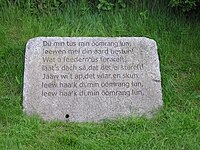lingvo.wikisort.org - Language
Amrum Frisian, or Öömrang, is the dialect of the North Frisian language spoken on the island of Amrum in the German region of North Frisia. Öömrang refers to the Öömrang Frisian name of Amrum, Oomram. Together with the Fering, Söl'ring, and Heligolandic dialects, it forms part of the insular group of North Frisian dialects, and it is very similar to Fering. Öömrang is spoken by about one third of Amrum's 2300 people.
| Amrum Frisian | |
|---|---|
| Öömrang | |
 A stone displaying a stanza from "Min Öömrang Lun", a traditional song from Amrum island | |
| Native to | Germany |
| Region | Amrum, Nordfriesland |
Native speakers | ca. 800[citation needed] |
Language family | Indo-European
|
| Language codes | |
| ISO 639-3 | – |
| Glottolog | amru1234 |
| Linguasphere | 2-ACA-dba[1] |
 North Frisian dialects | |
Characteristics
- Differentiation between long and short vowels by doubling of the vowel letter (e.g., lun [land, country] and skuul [school])
- Use of numerous diphthongs and one triphthong, "uai" (e.g. spuai [to tell fortunes])
- Frequent use of umlauts
- Final "w" is pronounced like a short "u" (e.g. leew [dear, sweet])
- The "r" is rolled (as in Italian)
Personal and family names
Personal names on Amrum are still today greatly influenced by a Frisian element. Notably, hypocorisms and names with two elements are common. Early borrowings were made from the Danish language and the Christianisation of the North Frisians around 1000 A.D. brought a modest influence of Christian and biblical names. In the Age of Sail, Dutch and West Frisian forms became popular.[2]
Family names were usually patronymic, i.e. they were individually created as genitives from the father's given name. Contrary to the Scandinavian Petersen or Petersson, meaning "Peter's son", an Öömrang name like Peters means "of Peter". This practice was eventually prohibited by the Danish Crown in 1828.[2]
Usage
Lars von Karstedt has illustrated the ominous situation of Öömrang today. The usage of Öömrang is now restricted in home domain. It has lost its function in public communication to German and is only spoken in the households with elderly native speakers of Öömrang. One of the biggest driving forces of the language shift is the change of economic structure brought by the tourism industry. The tourists from across Germany crowded into the small island of Amrum and have quickly taken up the limited housing. Consequently, the rent rapidly increased, driving a lot of the local youngsters out to live in major cities in mainland Germany. Both the influx of English-speaking or German-speaking tourists and tourism employees and the loss of young native speakers are causing drastic decline of the dialect.[3]
References
- "o" (PDF). The Linguasphere Register. p. 235. Archived from the original (PDF) on 27 August 2014. Retrieved 1 March 2013.
- Faltings, Volkert F., ed. (1985). Kleine Namenkunde für Föhr und Amrum (in German). Hamburg: Helmut Buske. ISBN 3-87118-680-5.
- Granadillo, Tania and Orcutt-Gachiri, Heidi A., eds. (2011). Ethnographic contributions to the study of endangered languages. with a foreword by Jane H. Hill; and an afterword by Ofelia Zepeda. Tucson: University of Arizona Press. pp. 155–158. ISBN 9780816526994.
На других языках
- [en] Amrum North Frisian
[es] Frisón de Amrum
El frisón de Amrum (autoglotónimo: Öömrang; en alemán, Amrumer Friesisch o Amring) es un dialecto del idioma frisón septentrional, hablado en la isla de Amrum. Junto con los dialectos Söl'ring, Fering y Halunder, forma parte del grupo insular de los dialectos frisones del norte; es muy similar al Fering. Difiere de los dialectos de tierra firme por la influencia relativamente intensa que ha sufrido por parte de la lengua danesa.[1][ru] Эмранг
Эмранг (с.-фриз. Öömrang) — один из диалектов севернофризского языка. На нём говорят на острове Амрум в районе Северная Фрисландия в земле Шлезвиг-Гольштейн в Германии. Этот диалект принадлежит к островной группе севернофризских диалектов.Другой контент может иметь иную лицензию. Перед использованием материалов сайта WikiSort.org внимательно изучите правила лицензирования конкретных элементов наполнения сайта.
WikiSort.org - проект по пересортировке и дополнению контента Википедии